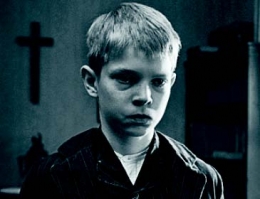THE CANNES Film Festival sometimes brings big surprises. It’s not unheard of for unlikely films to win all the plaudits while touted flicks are missing from the list of winners.
For ten days thousands of punters, journalists and industry experts pondered over the good and the not-so-good on offer. But in the end, it is the nine members of the festival jury who actually make the choices, and this year they gave the top prize to Michael Haneke’s Das Weisse Band (The White Ribbon).
Haneke’s films are best described as dark mirrors of our reality. Ordinary things happen in a normal way, but they are seen through the eyes of a filmmaker who has a largely pessimistic vision of the human condition. His lens peers below normality and explores the perverse behaviour and twisted motivations of his characters.
The white ribbon of the title refers to a ribbon that an authoritarian pastor forces his eldest son and daughter to wear as punishment, to remind them of the purity they are sacrificing by their errant ways.
Shot in black and white, it takes place in an agricultural village in Germany in 1913–14 on the eve of the Great War, and it could be said that this representation of the period shows how the bitter seeds of the younger German generation were sown through excessive discipline and high-minded virtue.
Children, women and the lower classes are victims. A series of malicious crimes is committed: a horse is tripped by a wire, injuring the village doctor as he gallops home; the baron’s child is hung upside down and flogged; a handicapped child has his eyes gouged… We are curious to know and fully expect to find out who is behind these acts, but the filmmaker’s art is to reveal the processes of disintegration rather than provide a neat outcome. Sometimes questions and doubt are more interesting than answers.
However, one outcome for this film was clear. After taking the Cannes Best Director award for Caché (Hidden) in 2005 and the Grand Prix du Jury in 2001 for La Pianiste (The Piano Teacher), last Sunday Haneke finally won the festival’s top prize, the Palme d’Or.
Haneke accepted the prize with these words: “Thank you very much. Sometimes my wife asks me a very feminine question: that is, am I happy. Well, let me say that at this moment in time, I am very happy.” Maybe his next film will be a musical comedy.
Elsewhere, the much favoured French film A Prophet was awarded the second-prize Grand Prix du Jury. It is a superior prison drama that follows the hardcore trials and tribulations of Malik, an illiterate young Arab in a French prison, over the duration of his six-year stretch.
Malik is confronted with extreme survival choices, beginning with an order to murder a fellow Arab from the Corsicans who rule the roost from the inside. He does the deed, learns to read and write and continues to make smart decisions, dodging fatal traps and winning battles against the odds.
Despite some implausibility and a certain glorification of criminal gang politics and violence, this is a very strong and gripping film, which offers an excellent performance from newcomer Tahar Rahim in the lead role.
The prize for best actress went to Charlotte Gainsbourg for her excellent and extreme performance in Lars Von Trier’s Antichrist, a controversial film that – in true Von Trier tradition
– divided his audience neatly in two. Meanwhile the prize for best actor went to Christoph Waltz, who plays the Nazi ‘Jew hunter’ in Quentin Tarantino’s Inglorious Bast-erds, a film that seeks to reduce the complexities of the Second World War to a piece of two-dimensional adolescent comic book fantasy.
The worthy recipient of the best first film award, the Camera d’Or, was the Australian picture Samson and Delilah by Warwick Thornton, which tells an intensely tough Aboriginal love story that manages to include large doses of glue sniffing and racial contempt, yet leaves us with a sense of optimism in the resilience of the human spirit.
Séamas McSwiney is an Irish film journalist based in France












